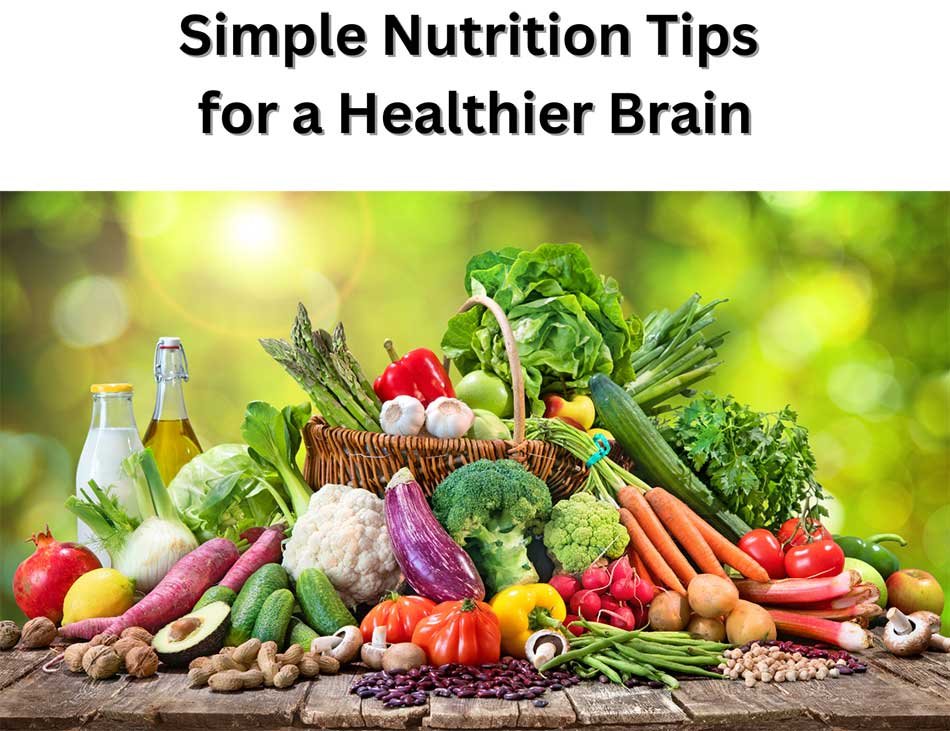
If you know someone who could benefit from this article, please share it with them. Simple nutrition tips can support brain health and enhance focus, memory, and overall cognitive function.
Simple Nutrition Tips for a Healthier Brain
Why Nutrition Matters for Brain Health
Your brain is an energy-intensive organ, using about 20% of the body’s calories. What you eat has a profound impact on its function, affecting memory, focus, mood, and long-term health. Incorporating brain-boosting nutrients into your diet can enhance cognitive performance and reduce the risk of neurological decline.

Benefits of Brain-Healthy Nutrition
- Improves Focus and Concentration: Provides sustained energy and mental clarity.
- Supports Memory: Enhances the brain’s ability to store and recall information.
- Reduces Risk of Cognitive Decline: Protects against age-related conditions like dementia.
- Boosts Mood: Regulates neurotransmitters that influence emotional well-being.
Simple Nutrition Tips for a Healthier Brain
1. Eat Omega-3 Fatty Acids
Omega-3s are essential for brain health, supporting cell structure and communication.
- Sources:
- Fatty fish (salmon, mackerel, sardines).
- Walnuts, flaxseeds, and chia seeds.
- Algae-based supplements (for plant-based diets).
- Benefit: Enhances memory and reduces inflammation in the brain.
2. Include Antioxidant-Rich Foods
Antioxidants protect the brain from oxidative stress, which can damage cells.
- Sources:
- Berries (blueberries, strawberries, blackberries).
- Dark chocolate (70% cocoa or higher).
- Leafy greens (spinach, kale, broccoli).
- Benefit: May slow brain aging and improve memory.
3. Stay Hydrated
Dehydration can impair focus, memory, and mood.
- Tips:
- Aim for at least 8 glasses of water a day.
- Eat water-rich foods like cucumbers, watermelon, and oranges.
- Limit caffeine and alcohol, which can dehydrate the body.
4. Balance Blood Sugar Levels
Stable blood sugar is essential for consistent energy and focus.
- How:
- Choose complex carbohydrates like whole grains, legumes, and sweet potatoes.
- Pair carbs with protein or healthy fats to slow sugar absorption.
- Avoid sugary snacks and drinks that cause energy crashes.
5. Add Brain-Boosting Vitamins and Minerals
Certain vitamins and minerals play a crucial role in brain function.
- Examples:
- Vitamin B6, B12, and folate: Found in eggs, leafy greens, and fortified cereals.
- Magnesium: Found in nuts, seeds, and dark chocolate.
- Zinc: Found in pumpkin seeds, chickpeas, and beef.
- Benefit: Supports neurotransmitter production and cognitive health.
6. Incorporate Healthy Fats
The brain is made up of about 60% fat, making healthy fats vital for its function.
- Sources:
- Avocados.
- Extra virgin olive oil.
- Nuts and seeds.
- Benefit: Improves cognitive performance and mood stability.
7. Limit Processed Foods
Processed foods high in refined sugars and unhealthy fats can negatively impact brain health.
- Examples:
- Swap chips for nuts or seeds.
- Replace sugary cereals with oatmeal topped with fresh fruit.
- Opt for whole, unprocessed foods whenever possible.
8. Enjoy Fermented Foods
A healthy gut supports a healthy brain, as the two are closely connected.
- Sources:
- Yogurt with live cultures.
- Kimchi, sauerkraut, and kombucha.
- Miso and tempeh.
- Benefit: Enhances mood and cognitive function by supporting gut bacteria.
Creating a Brain-Healthy Meal Plan
Example Day:
- Breakfast: Scrambled eggs with spinach and avocado on whole-grain toast.
- Snack: Handful of walnuts and a piece of dark chocolate.
- Lunch: Grilled salmon salad with mixed greens, quinoa, and olive oil dressing.
- Snack: Greek yogurt with blueberries and chia seeds.
- Dinner: Roasted chicken, sweet potatoes, and steamed broccoli.
Practical Tips for Success
- Plan Ahead: Prepare meals and snacks in advance to make healthy choices easier.
- Start Small: Incorporate one or two brain-boosting foods into your diet each week.
- Stay Consistent: Make brain-healthy eating a long-term habit for lasting benefits.
- Experiment with Recipes: Try new dishes featuring brain-friendly ingredients to keep meals exciting.
Picture This
Imagine a sharper mind, improved focus, and better memory—all fueled by the nutritious foods you eat. By incorporating these simple tips, you support your brain’s health and create a foundation for a vibrant, fulfilling life. What brain-healthy food will you add to your meals today?






